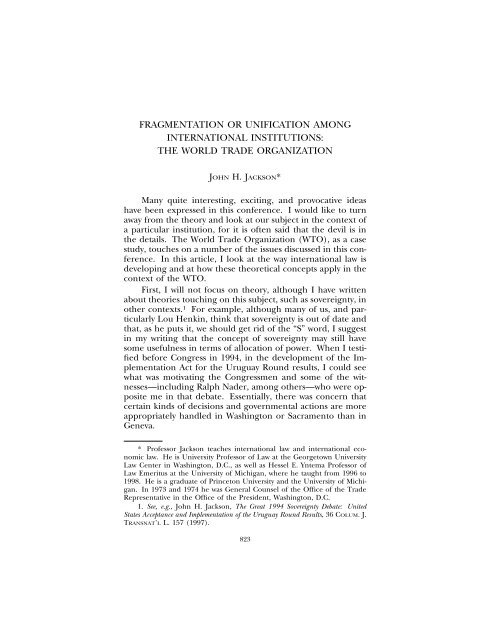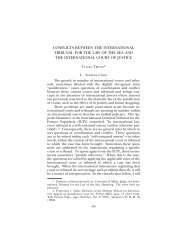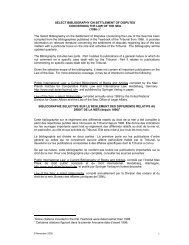John H. Jackson, Fragmentation or Unification Among International ...
John H. Jackson, Fragmentation or Unification Among International ...
John H. Jackson, Fragmentation or Unification Among International ...
Create successful ePaper yourself
Turn your PDF publications into a flip-book with our unique Google optimized e-Paper software.
FRAGMENTATION OR UNIFICATION AMONGINTERNATIONAL INSTITUTIONS:THE WORLD TRADE ORGANIZATIONJOHN H. JACKSON*Many quite interesting, exciting, and provocative ideashave been expressed in this conference. I would like to turnaway from the the<strong>or</strong>y and look at our subject in the context ofa particular institution, f<strong>or</strong> it is often said that the devil is inthe details. The W<strong>or</strong>ld Trade Organization (WTO), as a casestudy, touches on a number of the issues discussed in this conference.In this article, I look at the way international law isdeveloping and at how these the<strong>or</strong>etical concepts apply in thecontext of the WTO.First, I will not focus on the<strong>or</strong>y, although I have writtenabout the<strong>or</strong>ies touching on this subject, such as sovereignty, inother contexts. 1 F<strong>or</strong> example, although many of us, and particularlyLou Henkin, think that sovereignty is out of date andthat, as he puts it, we should get rid of the “S” w<strong>or</strong>d, I suggestin my writing that the concept of sovereignty may still havesome usefulness in terms of allocation of power. When I testifiedbef<strong>or</strong>e Congress in 1994, in the development of the ImplementationAct f<strong>or</strong> the Uruguay Round results, I could seewhat was motivating the Congressmen and some of the witnesses—includingRalph Nader, among others—who were oppositeme in that debate. Essentially, there was concern thatcertain kinds of decisions and governmental actions are m<strong>or</strong>eappropriately handled in Washington <strong>or</strong> Sacramento than inGeneva.* Profess<strong>or</strong> <strong>Jackson</strong> teaches international law and international economiclaw. He is University Profess<strong>or</strong> of Law at the Ge<strong>or</strong>getown UniversityLaw Center in Washington, D.C., as well as Hessel E. Yntema Profess<strong>or</strong> ofLaw Emeritus at the University of Michigan, where he taught from 1996 to1998. He is a graduate of Princeton University and the University of Michigan.In 1973 and 1974 he was General Counsel of the Office of the TradeRepresentative in the Office of the President, Washington, D.C.1. See, e.g., <strong>John</strong> H. <strong>Jackson</strong>, The Great 1994 Sovereignty Debate: UnitedStates Acceptance and Implementation of the Uruguay Round Results, 36 COLUM. J.TRANSNAT’L L. 157 (1997).823
824 INTERNATIONAL LAW AND POLITICS [Vol. 31:823But I want to add that this process w<strong>or</strong>ks both verticallyand h<strong>or</strong>izontally. The vertical process operates between Geneva,Washington, Sacramento, <strong>or</strong> your village. H<strong>or</strong>izontally,there is the so-called “separation of powers” question on whichPhilip Allott has cast some doubt. I think this is a very imp<strong>or</strong>tantconcept that applies at the international level as well asthe national level. There are also several dimensions to thisconcept. One is the idea that we do not trust humans enoughto be very comf<strong>or</strong>table with a monopoly of power in anyhuman institution, so we want to prevent a monopoly ofpower. This leads to a struggle among power centers that canarguably promote good and long-lasting approaches to “constitutionalism.”But then, of course, there are questions of differentkinds of institutions: judicial, administrative, and legislative—andmaybe lots of little things in between. We now seethat tensions among the different functions—tensions whichhave existed f<strong>or</strong> many centuries and are now apparent in thecontext of the WTO—are tensions w<strong>or</strong>th considering.One over-arching principle is that we are dealing witheconomic affairs. Clearly at least the questions can be askedwhether there should be a difference as to the underlying puzzlesposed f<strong>or</strong> this conference (i.e., fragmentations <strong>or</strong> unifications),with respect to those puzzles regarding human rightson one hand and economic affairs on the other. I think thereis a plausible case f<strong>or</strong> such differences, although I confess thatI have not thought it all the way through and am sure thatthere will be some controversial and different ideas on thissubject. In any event, one of these differences is that in economicaffairs we are now dealing with a m<strong>or</strong>e globalized andinterdependent economy. That suggests m<strong>or</strong>e of a need tounify the rules applying to all market participants, whereverthey may be.Those are just some ideas that I put on the table f<strong>or</strong> alater discussion. Obviously, we began with the General Agreementon Tariffs and Trade (GATT), which applied to goods.From its <strong>or</strong>igin to perhaps its last decade, the GATT waslargely focused on b<strong>or</strong>der measures. Now we have changedthe institution. We have developed a new W<strong>or</strong>ld Trade Organization.The GATT still lives, incidentally, because the substanceof provisions of GATT are part of an annex to theWTO. In addition, we have added trade in services and traderelatedintellectual property, which are also covered in an-
1999] WORLD TRADE ORGANIZATION 825nexes to the WTO. So we have en<strong>or</strong>mously broadened thecontext and the competence of this <strong>or</strong>ganization—not justthreefold, but arguably many m<strong>or</strong>e-fold. And what is happening—bothwith respect to the new subjects and indeed to theGATT itself—with m<strong>or</strong>e focus on the national treatmentclause of Article 3, is that its procedures and its n<strong>or</strong>ms are beginningto touch the vital nerves of the “S” w<strong>or</strong>d: sovereignty.In other w<strong>or</strong>ds, the vital nerves of how national governmentsgo about their economic regulation are being brought intoplay in connection with these matters of competence in theWTO. Thus, these matters have caused a great deal m<strong>or</strong>e publicinterest, outcry, and tension as it becomes obvious thatsome decisions made in Geneva actually hurt the pocketbooksof those in Wall Street firms <strong>or</strong> on Iowa farms. And it is theref<strong>or</strong>enot surprising that these citizens go to their various politicaldelegates and try to shape policies, not only in Washington,but also in Geneva.In <strong>or</strong>der to evaluate an <strong>or</strong>ganization <strong>or</strong> a regime, if wewant to call it that, we really do have to look at its goal. Andthe goal here in economic affairs has been, first of all, to limitwhat governments can do with respect to b<strong>or</strong>der measures affectingtrade. But now attention goes to the impact of internalmeasures affecting trade and to limits on what governmentscan do, so that they will not get into a race to the bottom <strong>or</strong> a“prisoner’s dilemma.” In other w<strong>or</strong>ds, governments acting independentlycan take a series of actions that end up being disastrousf<strong>or</strong> all. There must be some s<strong>or</strong>t of cooperative mechanism.We are dealing with a process involving the global systemsas we know them today, systems which, especially inrecent decades, have tended to focus on market economyprinciples. We are dealing with the decentralized decisionmakingof millions and millions of entrepreneurs. So one ofthe goals of this system is to have a rule structure that providesa certain amount of predictability and stability, which will helpshape how those millions and millions of economic decisionsare and can be made. Another way of looking at it is the notionthat this predictability will allow entrepreneurs to reducewhat is often called the “risk premium.” (This view is from theeconomists from whom I have been privileged to draw wisdom.)With investment in an atmosphere where risks aresomewhat reduced, invest<strong>or</strong>s can and will accept a smaller return.This premium f<strong>or</strong> the reduction of risk is arguably an
826 INTERNATIONAL LAW AND POLITICS [Vol. 31:823imp<strong>or</strong>tant element in the m<strong>or</strong>e efficient allocation of productiveresources in the w<strong>or</strong>ld, including investment market penetrationideas, activities, and services. So it may be that thislandscape I have just painted would suggest a substantially differentconsideration than from the human rights area, and indeedfrom some of the other endeav<strong>or</strong>s of international relations.Secondly, let me turn to a very brief overview of theGATT/WTO institution and its hist<strong>or</strong>y. Most of you are familiarwith this, but I will trouble you with this w<strong>or</strong>d “constitutional”<strong>or</strong> “constitutionalism.” This has been the subject ofsome discussion in a speech by the Direct<strong>or</strong> General of theWTO himself. But part of the reason why I am troubled bythis w<strong>or</strong>d is because it has so many different definitions. I willuse the term “constitutionalism” <strong>or</strong> “constitutional evolution”to describe what we see in the hist<strong>or</strong>ical process that got uswhere we are now, compared to where we were at the end ofW<strong>or</strong>ld War II.The overall characterization of this hist<strong>or</strong>y is that the institutionshave developed bottom up, rather than top down.That is because the <strong>or</strong>iginal concept of an <strong>International</strong> TradeOrganization (ITO), developed between the 1944 BrettonWoods Conference and the 1948 Havana Conference, failed tomaterialize. The ITO never came into being. The GATT was<strong>or</strong>iginally designed as a sub<strong>or</strong>dinate part of the ITO and theGATT was to be dependent on it f<strong>or</strong> all of its institutionalbackups, such as a secretariat and dispute settlement processes(elab<strong>or</strong>ated at length in the Havana Charter).That plan failed, and theref<strong>or</strong>e the GATT, despite its meagerlanguage, was left in place to fill this gap over time. F<strong>or</strong>instance, the GATT basically has two paragraphs on disputesettlement, and arguably another paragraph in another article.At the beginning there was quite a bit of difference in viewpointas to what those clauses meant. The language in theGATT spoke of something called “nullification” <strong>or</strong> “impairment.”It did not necessarily target the question of “breach” oftreaties. The language of this GATT dispute settlement articlemeant that a breach was neither a necessary n<strong>or</strong> a sufficientbasis to bring what you might call a “complaint.” So at the verystart there was a tension about the goals of this procedure. Onthe one hand, there were those who felt it was simply an extensionof the diplomatic process, what I describe as the “power
828 INTERNATIONAL LAW AND POLITICS [Vol. 31:823I think it was fair to say that the United States was pushinghard f<strong>or</strong> a rule <strong>or</strong>iented system and f<strong>or</strong> improvement of thedispute settlement process. The Europeans opposed that andtried to prevent any change to the settlement process beyondthat which had occurred in the evolution I described. Duringthe 1980s, however, the Europeans changed 180 degrees. Bythe end of that decade they came to embrace the need f<strong>or</strong> astronger dispute process with implementation of what mightbe called “sanctions” in appropriate cases. There are variousreasons f<strong>or</strong> this shift, but arguably among them was the socalledU.S. “unilateralism.” The Europeans felt that the institutionsneeded some s<strong>or</strong>t of check on U.S. unilateralism. Hasthat succeeded? So far, f<strong>or</strong> the first three and one-half years, ithas succeeded. The question remains: will it continue to succeed?It is interesting to note the difference between this andsome other dispute institutions, particularly the <strong>International</strong>Court of Justice (ICJ). The ICJ has little m<strong>or</strong>e than 100 caseson its docket, compared to the GATT/WTO which has approximately400 cases in this period. Since the creation of theWTO at the beginning of 1995, over 140 cases have beenbrought. A number of those have been settled independentlyin a process that appears very rule <strong>or</strong>iented, so that in fact therules are succeeding in leading to m<strong>or</strong>e settlements. Aboutfifteen cases have gone all the way through the process,through the appeal. The addition of an appeal is one of thestriking elements of this new procedure.Let me turn to some other questions that have beenraised. My third point looks at the question of how internationallaw interacts with the WTO system. Is this a hermeticallysealed regime? Clearly, the answer is no! And the answer hasalways been no, in my opinion. Some scholarly writings havesuggested the contrary, but I think those were wrong. And Ithink they have quite adequately been proven wrong. Eventhe late GATT jurisprudence referred to the Vienna Conventionon the Law of Treaties and to customary internationallaw. Late panel rep<strong>or</strong>ts also referred to international law principles.Even the WTO’s first case, the Gasoline Case, explicitlyreferred to international law—including, in particular, Article
1999] WORLD TRADE ORGANIZATION 82931 of the Vienna Convention—as guiding the panels and theappellate body. 2There is a series of other examples of the use of internationalconcepts in the GATT/WTO dispute cases. The questionof the right of a government to hire a private counsel ofits own choosing clearly has been influenced by general internationallaw and seems to be m<strong>or</strong>e <strong>or</strong> less settled. 3 There is aquestion of what constitutes practice under the agreementthat was discussed in the Japanese Alcoholic Beverages Case. 4There are questions about the precedential effect of opinions.All of those have been referred to and all generally have inc<strong>or</strong>p<strong>or</strong>atedinternational law concepts. I have discussed this issuewith some of the appellate body members, and there is verylittle doubt in my mind that international law clearly is the motivatingumbrella f<strong>or</strong> their w<strong>or</strong>k.My fourth point—which I will only discuss briefly—touches on the relationship of national and international rules<strong>or</strong> n<strong>or</strong>ms in this area. I have already referred to the notion ofseparation of powers, leading to the question: Can you take anational constitutional concept and use it internationally byanalogy? The answer is given only with great care, because certainlythere are some instances in which the analogy fails.There was an attempt to bring into the international treaty aU.S. concept of standard of review and court review of administrativeprocesses. I think this attempt was totally inappropriate,and it was not accepted. I have written an article aboutthat subject, 5 so I will leave that to complete the point.2. See United States—Standard f<strong>or</strong> Ref<strong>or</strong>mulated and Conventional Gasolineand Like Products of National Origin, Rep<strong>or</strong>t of the Panel, W.T.O.Doc. WT/DS2/R (Jan. 29, 1996), 35 I.L.M. 274, 293-94 & n.25; UnitedStates—Standards f<strong>or</strong> Ref<strong>or</strong>mulated Conventional Gasoline, Rep<strong>or</strong>t of theAppellate Body, W.T.O. Doc. WT/DS2/AB/R (May 20, 1996), 35 I.L.M. 603.3. See European Communities—Regime f<strong>or</strong> the Imp<strong>or</strong>tation, Sale andDistribution of Bananas, Rep<strong>or</strong>t of the Appellate Body, para. 10, W.T.O.Doc. WT/DS27/AB (Sept. 9, 1997).4. See Japan—Taxes on Alcoholic Beverages, Rep<strong>or</strong>t of the AppellateBody, W.T.O. Doc. WT/DS8/B/R, WT/DS/10/AB/R, WT/DS11/AB/R(Oct. 4, 1996), overruling Japan—Taxes on Alcoholic Beverages, Rep<strong>or</strong>t ofthe Panel, W.T.O. Doc. WT/DS/8/R, WT/DS10/R, WT/DS11/R (July 11,1996).5. See Steven Croley & <strong>John</strong> H. <strong>Jackson</strong>, WTO Dispute Procedures, Standardof Review, and Deference to National Governments, 90 AM. J. INT’L L. 193 (1996).
830 INTERNATIONAL LAW AND POLITICS [Vol. 31:823A fifth point involves what is happening now in terms ofthe constitutional and jurisprudential developments. From along list, let me mention two concepts that I think are reallyquite striking. First, in this international constraint on domesticeconomic regulation: how much deference should the international<strong>or</strong>ganization give to national government decisions?I think the appellate body and the panel are strugglingwith this question, and I see strong hints in several of the casesthat there will be a concept of deference. There will be anidea that the national governments have to have somethinglike a “margin of appreciation” <strong>or</strong> room to maneuver. Andthere are phrases in those decisions that I have written aboutthat would supp<strong>or</strong>t such a conclusion. 6 Second, anotherclosely related concept is judicial restraint. Indeed, the DisputeSettlement Understanding (DSU) itself obliges thepanels not to make rep<strong>or</strong>ts that would change the rights <strong>or</strong>obligations of the members. I join others who view that provisionas a s<strong>or</strong>t of shot over the bow by the negotiat<strong>or</strong>s whoframe these treaties, warning the panel process not to be toojudicially “active.”A sixth point regards procedures. I will take up just a fewprocedural points with which people are now struggling. Ihave already mentioned the right to counsel, as well as presumptionssuch as prima facie nullification <strong>or</strong> impairment.There is a big discussion of “burden of proof,” and a very interestingquestion of how the panel should receive and utilize scientificevidence that relates to economic regulation. 7 I thinkthere is a wealth of WTO jurisprudence, and some of thisshould now be useable in other parts of international law.This is s<strong>or</strong>t of a two-way flow of influences. The jurisprudenceof the GATT/WTO system as a whole is so much m<strong>or</strong>e extensivethan almost any other international body that it merits ourcloser attention.My seventh point is the question of compliance, which hasbeen pretty good so far. We are now coming to a periodwhere there is anxiety about whether some of the maj<strong>or</strong> powerswill in fact comply with some of the cases that have been6. See id.7. See, e.g., EC Measures Concerning Meat and Meat Products (H<strong>or</strong>mones),Rep<strong>or</strong>t of the Appellate Body, W.T.O. Doc. WT/DS26/AB/R (Jan.16, 1998).
1999] WORLD TRADE ORGANIZATION 831decided recently. F<strong>or</strong> Europe, there are the H<strong>or</strong>mones Case 8and the Bananas Case. 9 F<strong>or</strong> the United States, there is theShrimp-Turtle Case, 10 which is on appeal. In fact, one of thereasons why Judge Feliciano did not attend this symposium isthat he was on the division of the appellate body in that case.My last point, which I will make very briefly, is that thisyear is supposedly the year f<strong>or</strong> review of the dispute settlementprocess, as mandated by a ministerial declaration in April1994. 11 So there is the notion of taking a look at this whole setof procedures. There are lots of invent<strong>or</strong>ies of what to do, andthere are 80 to 100 items on many of those invent<strong>or</strong>ies. Discussionof these invent<strong>or</strong>ies will have to be reserved f<strong>or</strong> thefuture. F<strong>or</strong> the present, although it is too soon to be sure,there is much expression of satisfaction with the way the systemhas w<strong>or</strong>ked so far.8. See id.9. See European Communities—Regime f<strong>or</strong> the Imp<strong>or</strong>tation, Sale andDistribution of Bananas, Rep<strong>or</strong>t of the Panel, W.T.O. Doc. WT/DS27/RW/EEC (Apr. 12, 1999), available in 1999 WL 216742.10. See United States—Imp<strong>or</strong>t Prohibition of Certain Shrimp and ShrimpProducts, Rep<strong>or</strong>t of the Appellate Body, W.T.O. Doc. WT/DS58/AB/R(Oct. 12, 1998), available in 1998 WL 720123, modifying United States—Imp<strong>or</strong>tProhibition of Certain Shrimp and Shrimp Products, Rep<strong>or</strong>t of thePanel, W.T.O. Doc. WT/DS58/R (May 15, 1998), available in 1998 WL256632.11. See Decision on the Application and Review of the Understanding onRules and Procedures Governing the Settlement of Disputes, Ministerial Decisionadopted by the Trade Negotiations Committee of the Uruguay Roundof Multilateral Trade Negotiations, 33 I.L.M. 1125, 1259 (Apr. 15, 1994).






